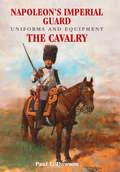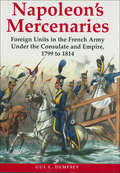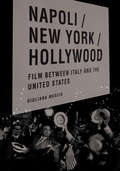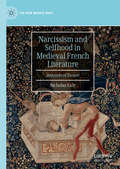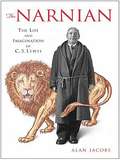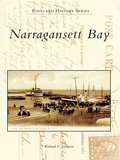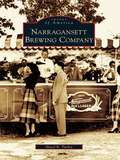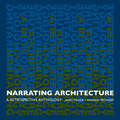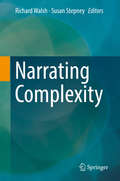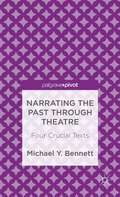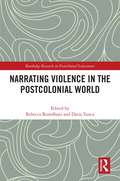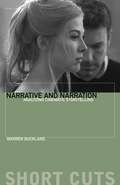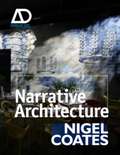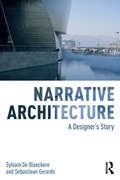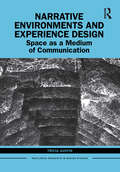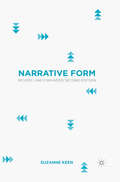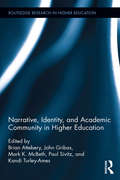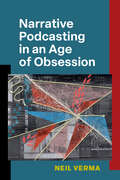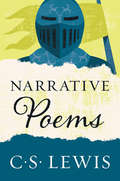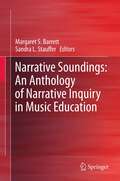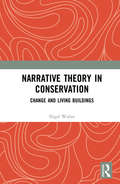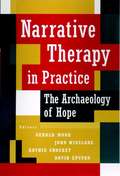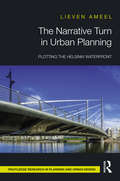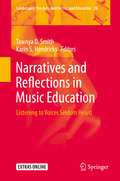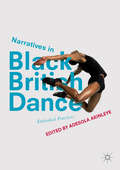- Table View
- List View
Napoleon's Imperial Guard Uniforms and Equipment. Volume 2: The Cavalry
by Paul L. DawsonThe author of Battle for Paris 1815 examines the uniforms and equipment of the cavalry of Napoleon&’s Imperial Guard. Few military formations have attracted more attention than Napoleon&’s Imperial Guard, and fewer still have been so extravagantly clothed and accoutered with the finest materials and the brightest colors. On both campaign and parade, the Guard, and especially the cavalry regiments, provided a dazzling display of military grandeur. From the green and gold trappings of the Chasseurs à Cheval, to the multicolored Mamelukes, the Guard cavalry was among the most brilliantly dressed formations ever to grace the field of battle. In compiling this magnificent volume, the author has collected copies of almost all the surviving documents relating to the Guard, which includes a vast amount of material regarding the issuing of dress items, even in some instances down to company level. This information is supported by around 100 contemporary prints, many of which have never been published before, as well as images of original items of equipment held in museums and private collections across the globe. In addition, the renown military artist, Keith Rocco has produced a series of unique paintings commissioned exclusively for this book. This glorious book is, and will remain, unsurpassed as the standard work on the clothing and equipment of the cavalry of the Imperial Guard. It is sure to be treasured by reenactors, wargamers, and modelers, as well as historians and enthusiasts as one of the most important publications ever produced on this most famous of military formations.
Napoleon's Mercenaries: Foreign Units in the French Army Under the Consulate and Empire, 1799 to 1814 (Napoleonic Library)
by Guy DempseyThis superb and comprehensive book details the foreign units which formed such an important part of Napoleon's forces. It examines each non-French unit in turn, giving an overview of the unit's origins, its organizational and combat history, its uniforms and standards, and details of the unit's eventual fate. Colourful accounts, taken from contemporary reports and memoirs, emphasize the qualities of the unit and throw light on what life was like for many of the foreign soldiers recruited into the Grande Armée. In total more than 100 different foreign units that served in the French Army are investigated in detail in this ambitious publication. Some foreign units fought and flourished throughout the Consulate and Empire, whilst others lasted for just a few months. Covers Polish, German, Swiss, Italian, Spanish, and other units in the French Army and presents a combat history and details uniforms for each regiment. Napoleon's Mercenaries is the best single-volume study of this aspect of Napoleon s army and a vital reference for every Napoleonic enthusiast. Little can be found on the foreign units that were an integral part of the French army ... For a long time a gap has existed, but now Napoleon s Mercenaries fills this gap. Robert Burnham, Napoleonic Series
Napoli/New York/Hollywood: Film between Italy and the United States (Critical Studies in Italian America)
by Giuliana MuscioNapoli/New York/Hollywood investigates the work of Italian immigrant performers and the impact of the traditions of the Italian stage within the history of Hollywood cinema and of American media from 1895 to today. The book discusses the historical context and institutional film history, from the perspective of the performers–the workers, who lend their bodies and their performance culture to screen representations.Using an interdisciplinary approach, the book associates Southern Italian culture with Modernity and the immigrants’ preservation of cultural traditions with innovations in the mode of production and in the use of media technologies (theatrical venues, music records, radio, ethnic films.) It deeply revises the relation between fascism and American cinema, and Italian emigration.The book examines the careers of those Italian performers who were not only born in Italy or were of Italian descent, but came either from the immigrant or the Italian stage, in order to be able to credit their influence on a cultural level. This unknown story is reconstructed through primary sources and extensive film-viewing, in addition to a series of interviews with heirs to these traditions, such as Francis Coppola and his sister Talia Shire, John Turturro, Nancy Savoca, James Gandolfini, David Chase, Joe Dante, and Annabella Sciorra.
Narcissism and Selfhood in Medieval French Literature: Wounds of Desire (The New Middle Ages)
by Nicholas EalyThis book offers analyses of texts from medieval France influenced by Ovid’s myth of Narcissus including the Lay of Narcissus, Alain de Lille’s Plaint of Nature, René d’Anjou’s Love-Smitten Heart, Chrétien de Troyes’s Story of the Grail and Guillaume de Machaut’s Fountain of Love. Together, these texts form a corpus exploring human selfhood as wounded and undone by desire. Emerging in the twelfth century in Western Europe, this discourse of the wounded self has survived with ever-increasing importance, informing contemporary methods of theoretical inquiry into mourning, melancholy, trauma and testimony. Taking its cue from the moment Narcissus bruises himself upon learning he cannot receive the love he wants from his reflection, this book argues that the construct of the wounded self emphasizes fantasy over reality, and that only through the world of the imagination—of literature itself—can our narcissistic injuries seemingly be healed and desire fulfilled.
The Narnian: The Life and Imagination of C. S. Lewis
by Alan JacobsonBiography of Lewis and an analysis of his writings.
Narragansett Bay (Postcard History)
by Richard V. SimpsonRhode Island, "the Ocean State," consists of only 1,200 square miles, and one-quarter of the state is tidewater. With over 350 miles of coastline, a third of the citizens live within a mile of the seashore. The Narragansett Bay, spanning 102 square miles, is the heart of the state. From the early 19th to the mid-20th century, the shell and finfish industries flourished within the bay. Amusement parks and seaside dining halls sprang up on both sides. Beaches catered to Victorian ladies and gentlemen who took in the air but never wet their feet. The nation's security has also played a major role in these waters. Through more than 200 stunning images, readers will see how Rhode Islanders found their fortune and character on the Narragansett Bay.
Narragansett Brewing Company (Images of America)
by Hazel B. TurleyNarragansett Brewing Company was developed in 1890 by German American descendants in Cranston. Taking advantage of an underground aquifer, the company also made ice for thousands of customers. During Prohibition, the brewery continued to make and deliver ice, as well as a type of soda. After the repeal of Prohibition, the Haffenreffer familypurchased the brewery and began recalling previous workers to help restore the brewery and bring it to the highest production rate ever. After World War II,advertising manager Jack Haley shifted the company focus to hospitality with the now famous slogan, "Hi Neighbor, Have a 'Gansett!" Before long, Narragansett was the number one beer in New England. Through vintage photographs, Narragansett Brewing Company chronicles the fascinating history, tragic fall, and exciting rebirth of this local icon.
Narrating Architecture: A Retrospective Anthology
by Andrew Peckham James MadgeThis anthology brings together the best and most interesting papers from the first ten years of The Journal of Architecture, published together for the first time in a single volume. Covering a wide range of topics of central importance to architecture today, the papers also address the related topics to which architecture and architectural studies are inextricably linked. The invited authors draw on sociology, philosophy, cultural studies and the sciences to round out the collection and highlight the breadth and vitality of modern architectural studies, offering perspectives from different disciplines as well as different corners of the globe.
Narrating Complexity
by Richard Walsh Susan StepneyThis book stages a dialogue between international researchers from the broad fields of complexity science and narrative studies. It presents an edited collection of chapters on aspects of how narrative theory from the humanities may be exploited to understand, explain, describe, and communicate aspects of complex systems, such as their emergent properties, feedbacks, and downwards causation; and how ideas from complexity science can inform narrative theory, and help explain, understand, and construct new, more complex models of narrative as a cognitive faculty and as a pervasive cultural form in new and old media. The book is suitable for academics, practitioners, and professionals, and postgraduates in complex systems, narrative theory, literary and film studies, new media and game studies, and science communication.
Narrating the Past through Theatre
by Michael Y. BennettThis cutting-edge title explores how narrating the past both conflicts and creates an interesting relationship with drama's 'continuing present' that arcs towards an unpredictable future. Theatre both brings the past alive and also fixes it, but through the performance process, allowing the past to be molded for future (not-yet-existent) audiences.
Narrating Violence in the Postcolonial World (Routledge Research in Postcolonial Literatures)
by Rebecca Romdhani Daria TuncaThis book examines representations of violence across the postcolonial world—from the Americas to Australia—in novels, short stories, plays, and films. The chapters move from what appear to be interpersonal instances of violence to communal conflicts such as civil war, showing how these acts of violence are specifically rooted in colonial forms of abuse and oppression but constantly move and morph. Taking its cue from theories in such fields as postcolonial, violence, gender, and trauma studies, the book thus shows that violence is slippery in form, but also fluid in nature, so that one must trace its movement across time and space to understand even a single instance of it. When analysing such forms and trajectories of violence in postcolonial creative writing and films, the contributors critically examine the ethical issues involved in narrating abuse, depicting violated bodies, and presenting romanticized resolutions that may conceal other forms of violence.
Narrative and Narration: Analyzing Cinematic Storytelling (Short Cuts)
by Warren BucklandFrom mainstream blockbusters to art house cinema, narrative and narration are the driving forces that organize a film. Yet attempts to explain these forces are often mired in notoriously complex terminology and dense theory. Warren Buckland provides a clear and accessible introduction that explains how narrative and narration work using straightforward language.Narrative and Narration distills the basic components of cinematic storytelling into a set of core concepts: narrative structure, processes of narration, and narrative agents. The book opens with a discussion of the emergence of narrative and narration in early cinema and proceeds to illustrate key ideas through numerous case studies. Each chapter guides readers through different methods that they can use to analyze cinematic storytelling. Buckland also discusses how departures from traditional modes, such as feminist narratives, art cinema, and unreliable narrators, can complicate and corroborate the book’s understanding of narrative and narration. Examples include mainstream films, both classic and contemporary; art house films of every stripe; and two relatively new styles of cinematic storytelling: the puzzle film and those driven by a narrative logic derived from video games. Narrative and Narration is a concise introduction that provides readers with fundamental tools to understand cinematic storytelling.
Narrative Architecture
by Nigel CoatesThe first book to look architectural narrative in the eyeSince the early eighties, many architects have used the term "narrative" to describe their work. To architects the enduring attraction of narrative is that it offers a way of engaging with the way a city feels and works. Rather than reducing architecture to mere style or an overt emphasis on technology, it foregrounds the experiential dimension of architecture. Narrative Architecture explores the potential for narrative as a way of interpreting buildings from ancient history through to the present, deals with architectural background, analysis and practice as well as its future development.Authored by Nigel Coates, a foremost figure in the field of narrative architecture, the book is one of the first to address this subject directly Features architects as diverse as William Kent, Antoni Gaudí, Eero Saarinen, Ettore Sottsass, Superstudio, Rem Koolhaas, and FAT to provide an overview of the work of NATO and Coates, as well as chapters on other contemporary designers Includes over 120 colour photographs Signposting narrative's significance as a design approach that can aid architecture to remain relevant in this complex, multi-disciplinary and multi-everything age, Narrative Architecture is a must-read for anyone with an interest in architectural history and theory.
Narrative Architecture: A Designer's Story
by Sylvain De Bleeckere Sebastiaan GerardsNarrative Architecture explores the postmodern concept of narrative architecture from four perspectives: thinking, imagining, educating, and designing, to give you an original view on our postmodern era and architectural culture. Authors Sylvain De Bleeckere and Sebastiaan Gerards outline the ideas of thinkers, such as Edmund Husserl, Paul Ricoeur, Emmanuel Levinas, and Peter Sloterdijk, and explore important work of famous architects, such as Daniel Libeskind and Frank Gehry, as well as rather underestimated architects like Günter Behnisch and Sep Ruf. With more than 100 black and white images this book will help you to adopt the design method in your own work.
Narrative Environments and Experience Design: Space as a Medium of Communication (Routledge Research in Design Studies)
by Tricia AustinThis book argues narrative, people and place are inseparable and pursues the consequences of this insight through the design of narrative environments. This is a new and distinct area of practice that weaves together and extends narrative theory, spatial theory and design theory. Examples of narrative spaces, such as exhibitions, brand experiences, urban design and socially engaged participatory interventions in the public realm, are explored to show how space acts as a medium of communication through a synthesis of materials, structures and technologies, and how particular social behaviours are reproduced or critiqued through spatial narratives. This book will be of interest to scholars in design studies, urban studies, architecture, new materialism and design practitioners in the creative industries.
Narrative Form: Revised and Expanded Second Edition
by Suzanne KeenThis revised and expanded handbook concisely introduces narrative form to advanced students of fiction and creative writing, with refreshed references and new discussions of cognitive approaches to narrative, nonfiction, and narrative emotions.
Narrative, Identity, and Academic Community in Higher Education (Routledge Research in Higher Education)
by Brian Attebery John Gribas Mark K. McBeth Paul Sivitz Kandi Turley-AmesGrounded in narrative theory, this book offers a case study of a liberal arts college’s use of narrative to help build identity, community, and collaboration within the college faculty across a range of disciplines, including history, psychology, sociology, theatre and dance, literature, anthropology, and communication. Exploring issues of methodology and their practical application, this narrative project speaks to the construction of identity for the liberal arts in today’s higher education climate. Narrative, Identity, and Academic Community focuses on the ways a cross-disciplinary emphasis on narrative can impact institutions in North America and contribute to the discussion of strategies to foster bottom-up, faculty-driven collaboration and innovation.
Narrative Podcasting in an Age of Obsession
by Neil VermaIt has been a decade since Serial brought the narrative podcast to the center of popular culture. In that time, there has been an enormous boom in the production of podcasts that tell stories, particularly in the fields of true crime, storytelling, history, and narrative fiction. Now that the initial glow around the medium has begun to fade, it is time to reevaluate the medium’s technological, political, economic, and cultural rise, in particular what types of storytelling accompanied that rise. Narrative Podcasting in an Age of Obsession is the first book to look back on this prodigious body of material and attempt to make sense of it from a structural, historical, and analytic point of view. Focusing on more than 350 podcasts and other audio works released between Serial and the COVID pandemic, the book explores why so many of these podcasts seem “obsessed with obsession,” why they focus not only on informing listeners but also dramatizing the labor that goes into it, and why fiction podcasts work so hard to prove they are a brand new form, even as they revive features of radio from decades gone by. This work also examines the industry's reckoning with its own implication in systemic racism, misogyny, and other forms of discrimination. Employing innovative new critical techniques for close listening—including pitch tracking software and spectrograms—Narrative Podcasting in an Age of Obsession makes a major contribution to podcast studies and media studies more broadly.
Narrative Poems
by C. S. LewisA repackaged edition of the revered author’s collection of four poems: "Dymer," "Launcelot," "The Nameless Isle," and "The Queen of Drum."C. S. Lewis—the great British writer, scholar, lay theologian, broadcaster, Christian apologist, and author of Mere Christianity, The Screwtape Letters, The Great Divorce, The Chronicles of Narnia, and many other beloved classics—was also a talented poet. In this collection of four longer works of verse, Lewis displays his deep love for medieval and Renaissance poetry and themes, influences that shaped—and resonate through—his fiction.
Narrative Soundings: An Anthology of Narrative Inquiry in Music Education
by Sandra L. Stauffer Margaret S. BarrettThis volume focuses specifically on narrative inquiry as a means to interrogate research questions in music education, offering music education researchers indispensible information on the use of qualitative research methods, particularly narrative, as appropriate and acceptable means of conducting and reporting research. This anthology of narrative research work in the fields of music and education builds on and supports the work presented in the editors' first volume in Narrative Inquiry in Music Education: Troubling Certainty (Barrett & Stauffer, 2009, Springer). The first volume provides a context for undertaking narrative inquiry in music education, as well as exemplars of narrative inquiry in music education and commentary from key international voices in the fields of narrative inquiry and music education respectively.
Narrative Theory in Conservation: Change and Living Buildings
by Nigel WalterNarrative Theory in Conservation engages with conservation, heritage studies, and architectural approaches to historic buildings, offering a synthesis of the best of each, and demonstrating that conservation is capable of developing a complementary, but distinct, theoretical position of its own. Tracing the ideas behind the development of modern conservation in the West, and considering the challenges presented by non-Western practice, the book engages with the premodern understanding of innovation within tradition, and frames historic buildings as intergenerational, communal, ongoing narratives. Redefining the appropriate object of conservation, it suggests a practice of conserving the questions that animate and energize local cultures, rather than only those instantiated answers that expert opinion has declared canonical. Proposing a narrative approach to historic buildings, the book provides a distinctive new theoretical foundation for conservation, and a basis for a more equal dialogue with other disciplines concerned with the historic environment. Narrative Theory in Conservation articulates a coherent theoretical position for conservation that addresses the urgent question of how historic buildings that remain in use should respond to change. As such, the book should be of great interest to academics, researchers, and postgraduate students from the fields of conservation, heritage studies, and architecture.
Narrative Therapy in Practice: The Archaeology of Hope
by Gerald Monk Kathie Crocket David Epston John WinsladeHow to apply the definitive postmodern therapeutic technique in a variety of situations, including treating alcoholics, counseling students, treating male sexual abuse survivors, and more. Written with scholarship, energy, practicality, and awareness.
The Narrative Turn in Urban Planning: Plotting the Helsinki Waterfront
by Lieven AmeelNarratives, in the context of urban planning, matter profoundly. Planning theory and practice have taken an increasing interest in the role and power of narrative, and yet there is no comprehensive study of how narrative, and concepts from narrative and literary theory more broadly, can enrich planning and policy. The Narrative Turn in Urban Planning addresses this gap by defining key concepts such as story, narrative, and plot against a planning backdrop, and by drawing up a functional typology of different planning narratives. In two extended case studies from the planning of the Helsinki waterfront, it applies the narrative concepts and theories to a broad range of texts and practices, considering ways toward a more conscious and contextualized future urban planning. Questioning what is meant when we speak of narratives in urban planning, and what typologies we can draw up, it presents a threefold taxonomy of narratives within a planning framework. This book will serve as an important reference text for upper-level students and researchers interested in urban planning.
Narratives and Reflections in Music Education: Listening to Voices Seldom Heard (Landscapes: the Arts, Aesthetics, and Education #28)
by Tawnya D. Smith Karin S. HendricksThis volume offers chapters written by some of the most respected narrative and qualitative inquiry writers in the field of music education. The authorship and scope are international, and the chapters advance the philosophical, theoretical, and methodological bases of narrative inquiry in music education and the arts. The book contains two sections, each with a specific aim. The first is to continue and expand upon dialogue regarding narrative inquiry in music education, emphasizing how narrative involves the art of listening to and hearing others whose voices are often unheard. The chapters invite music teachers and scholars to experience and confront music education stories from multiple perspectives and worldviews, inviting an international readership to engage in critical dialogue with and about marginalized voices in music. The second section focuses on ways in which narrative might be represented beyond the printed page, such as with music, film, photography, and performative pieces. This section includes philosophical discussions about arts-based and aesthetic inquiry, as well as examples of such work.
Narratives in Black British Dance
by Adesola AkinleyeThis book explores Black British dance from a number of previously-untold perspectives. Bringing together the voices of dance-artists, scholars, teachers and choreographers, it looks at a range of performing arts from dancehall to ballet, providing valuable insights into dance theory, performance, pedagogy, identity and culture. It challenges the presumption that Blackness, Britishness or dance are monolithic entities, instead arguing that all three are living networks created by rich histories, diverse faces and infinite future possibilities. Through a variety of critical and creative essays, this book suggests a widening of our conceptions of what British dance looks like, where it appears, and who is involved in its creation.
